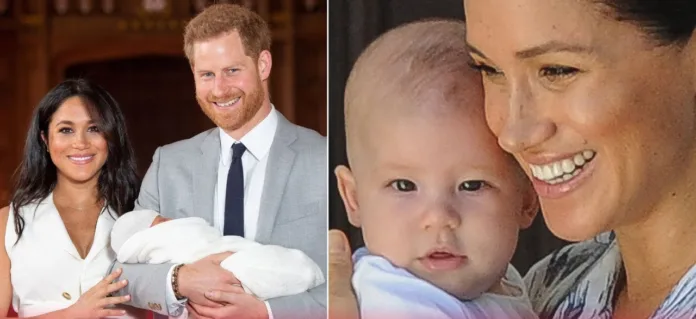Prince Harry and Meghan Markle defy a longstanding Royal custom, choosing the Sussex surname for their children on their revamped website
On Monday, Prince Harry and Meghan Markle unveiled a significant change on their newly launched website, sussex.com. This site, which replaced the former Archwell platform, now features their children, Prince Archie and Princess Lilibet, using the Sussex surname, breaking a 64-year-old Royal tradition.
The Mountbatten-Windsor surname, established in 1960 by the Privy Counsel under the guidance of Queen Elizabeth II’s officials, has been the designated surname for all male-line descendants of Her Majesty and Prince Philip. However, with the launch of their new website, the Sussexes have chosen to identify their children with the Sussex surname instead. This decision marks the first time since King Charles III’s coronation that the family shares the same surname, symbolizing their unity and a proud moment for the family, as revealed by an insider to The Times.
The revamped website not only highlights this change but also features Meghan’s specially-designed coat of arms and detailed biographies of the couple. Visitors are greeted with a welcome to “The Office of Prince Harry and Meghan, The Duke and Duchess of Sussex,” emphasizing their continued work and contributions.
Despite the positive reception of the new website, the use of Prince and Princess titles for their children has stirred controversy. Some Royal watchers have expressed surprise and raised eyebrows, accusing Harry and Meghan of leveraging their connections to the monarchy for prestige. Royal sources have reportedly expressed astonishment at the couple’s decision to refer to their children by their regal titles.
Prince Harry’s biography on the website states, “Prince Harry lives in California with his wife Meghan, and their two children Prince Archie and Princess Lilibet.” Meghan’s biography similarly reads, “Meghan lives in California with her husband and their children Prince Archie and Princess Lilibet.”
This bold move by Meghan and Harry continues to highlight their willingness to diverge from Royal conventions and traditions, further cementing their distinct identity within the Royal Family.
Analysis
Political The decision by Prince Harry and Meghan Markle to use the Sussex surname for their children can be seen as a political statement. It symbolizes their departure from traditional Royal norms and underscores their desire for independence from the constraints of Royal protocol. This move aligns with their previous actions, such as stepping back from Royal duties and relocating to the United States, which have continually challenged the status quo of the British monarchy. By choosing a different surname, they reinforce their commitment to establishing a new identity separate from the conventional Royal framework.
Social Socially, this decision reflects broader societal debates about tradition versus modernity. The Sussexes’ choice to break a long-standing tradition highlights the evolving nature of family identities and the growing acceptance of personal autonomy in defining one’s identity. This resonates with many who advocate for more contemporary interpretations of tradition and the freedom to choose one’s path. Their decision can be seen as empowering, especially for younger generations who may feel constrained by outdated norms.
Racial The choice of surname also touches on issues of race and representation. Meghan Markle, being of mixed race, has brought significant attention to issues of race within the Royal Family. By selecting the Sussex surname for their children, Meghan and Harry might be signalling a desire to create a more inclusive and diverse narrative within the Royal context. This decision can be viewed as part of their broader effort to challenge and redefine the traditional perceptions of the Royal Family, making it more representative of modern, multicultural Britain.
Gender From a gender perspective, the decision to use the Sussex surname promotes the idea of gender equality. Traditionally, surnames, especially in Royal contexts, have been patrilineal. By choosing a different surname, Meghan and Harry challenge this norm, promoting a more egalitarian approach to family identity. This move aligns with broader societal shifts towards gender equality and the reevaluation of traditional gender roles within families.
Economic Economically, the launch of the new website and the branding of their children under the Sussex surname can be seen as a strategic move. It helps in creating a distinct brand identity that can be leveraged for various commercial endeavours. This decision could potentially open up new opportunities for the Sussexes in terms of partnerships, endorsements, and other business ventures. By establishing a unique brand, separate from the traditional Royal Family, they position themselves for greater financial independence and sustainability.
